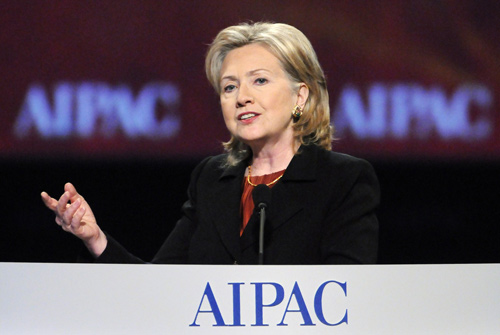Global General
Clinton reaffirms US-Israel alliance
(Xinhua)
Updated: 2010-03-23 08:57
 |
Large Medium Small |
WASHINGTON - Defusing tensions between the US and Israeli governments, Secretary of State Hillary Rodham Clinton on Monday said that the US commitment to Israel's security and future is "rock solid," and that the US-backed comprehensive peace in the Middle East is the "best way" for Israel's enduring survival.
 US Secretary of State Hillary Clinton speaks to the American Israel Public Affairs Committee annual policy conference in Washington, March 22, 2010. [Agencies] |
"Our commitment to Israel's security and Israel's future is rock solid," Clinton told an annual policy conference of the American Israel Public Affairs Committee (AIPAC), the most influential bi-partisan pro-Israel lobby in the United States.
"Guaranteeing Israel's security is more than a policy position for me. It is a personal commitment that will never waver," said the state secretary before some 7,500 pro-Israel activists.
As to Iran's nuclear program, which is accused by both the United States and Israel of aiming at developing nuclear weapons, Clinton said that the United States can not accept a nuclear-armed Iran and would prevent Tehran from acquiring nuclear weapons.
According to the state secretary, the United States is working with its partners in the United Nations on new Security Council sanctions "that will show Iran's leaders that there are real consequences for their intransigence, that the only choice is to live up to their international obligations."
"We will not compromise our commitment to preventing Iran from acquiring these weapons," she added.
On the Middle East peace process, Clinton warned that Israel's long-term future as a secure and democratic Jewish state has been facing "some of the toughest challenges in her history," referring to Iran's nuclear program, as well as Israel's persisting conflicts with the Palestinians and other Arab neighbors.
She told the pro-Israel activists that a comprehensive peace in the Middle East must be rooted in real recognition of Israel's right to exist in peace and security.
"A comprehensive peace that is real and not a slogan, that is rooted in genuine recognition of Israel's right to exist in peace and security, offers the best way to ensure Israel's enduring survival and well-being," Clinton said.
According to the secretary, to make Israel reach peace with the Palestinians, Syria and Lebanon, and normalize relations with all the Arab countries is "a goal that the Obama administration is determined to achieve."
Clinton's remarks came as the relationship between the United States and Israel was troubled by the Netanyahu-led government's tough stance on the Jewish settlement activities in the West Bank.
The Obama administration was angry over the Israeli government' s approval of 1,600 homes in East Jerusalem on March 9 when Vice President Joe Biden was pushing both Israel and the Palestinians to resume peace talks.
Both Biden and Clinton issued rare condemnations of Israel's move, which was described by Clinton as "a deeply negative signal" about Israel's approach to relations with Washington.
The administration has been exerting pressure on the Israeli government and the Palestinian National Authority (PNA) to resume the talks, so that the two sides could reach a permanent peace agreement that leads to the establishment of an independent Palestinian state within two years.
The talks were stalled in December 2008 when Israel launched a massive military campaign against the Islamic Hamas movement in the Gaza Strip.
PNA Chairman Mahmoud Abbas insists that the talks shall not resume until the Israeli government totally freezes the Jewish settlement construction in the West Bank, while the Israeli side vows to ensure the "natural growth" of the Jewish settlements.
At least 450,000 Israelis live in more than 100 settlements in the West Bank, including East Jerusalem.
After Israel's announcement to build more homes in East Jerusalem, the PNA decided to suspend the indirect talks with Israel, which were brokered by US special envoy George Mitchell following tough shuttle mediation between Israel and the Palestinians.
Mitchell has been in Israel and the West Bank for saving the indirect talks.
In an interview with Fox News on Wednesday, US President Barack Obama convinced the Israelis that the US-Israel relations would not be undermined by the disagreement over Jewish settlement activities.
"Israel's one of our closest allies, and we and the Israeli people have a special bond that's not going to go away," Obama said, adding that there was "no crisis" in the US-Israel relations and the United States sticks to its commitment to Israel.
President Obama on Tuesday is expected to meet with Israeli Prime Minister Benjamin Netanyahu who will be in Washington for addressing the AIPAC conference.










